QuestionHello Donna. I've owned my bearded dragon Reptar for just under a year now. It's estimated that he's about a year and 2 months old. He used to eat regularly every day. His diet consisted of about half greens (usually either escarole, collard greens, or kale (his personal favorite)) and insects (started out on phoenix worms, then onto meal worms, quickly switched to superworms after hearing horror stories of meal worms, and have recently tried Dubia roaches). He used to love superworms, but recently (as early as mid December), he's for the most part, stopped eating them. I bought Dubia roaches a week ago, and he liked them, but they hide better than crickets and worms, and he's too lazy to search for them. He also used to eat his greens everyday, but hasn't been doing so for about 2 weeks now.
Last weekend (after he stopped eating), I purchased a female bearded dragon, Cora. She is roughly a year and a half old. Reptar has shown signs of wanting to mate with her, but after noticing him trying to, I have kept them separated since. They share a tank, but there is a divider which they cannot see through or get through. She ate the first day that I brought her home, but since then she won't touch her food. Her diet at the pet store wasn't that great (carrots and a standard veggie blend with mealworms mostly), so I have tried introducing her to healthier foods. She liked the roaches as well, but again, they are difficult to find in their respective portions of the tank because they hide well and don't usually come out.
Some facts about the tank: The tank is 40 gal; both dragons have 20 gal to themselves. Reptar is about 16 inches long, Cora about 14 and seems skinnier (but I think that has to do with her pet store diet. Reptar has always eaten well and still looks very healthy). Their basking sides have temperatures around 88-90, and both sides of the tank have cooler sides reaching temperatures of about 80. The humidity looks good as well. Each side has fresh water, and I use basking lamps and an overhead UV light that covers both sides of the tank.
My main concern is Reptar. He stopped eating before I got Cora, before I put him in a new tank. He had been in his old tank for months (a 20 gal) by himself, and had always eaten well until mid-December when he stopped eating the super worms. He doesn't seem to be any less active than he's always been, and he doesn't seem stressed because of the new lizard. Cora I am less worried about because it has been just under a week that she's stopped eating. She is also in the process of shedding, and I know that Reptar usually eats less during this time, so it's possible that she does that as well. She also seems to be eating her insects pretty well, so really she just has a problem with greens. I have tried using different greens, feeding them both by hand, and separating the two when they eat if it's an issue with pheromones, but nothing has worked.
I tried giving you as much information as I can, I hope you can help! Thanks!
AnswerDiscontinue the kale--in spite of the fact that he liked it, it's actually a member of the cabbage family. You see it on some care sheets due to the fact that the writer didn't really know what the vegetable was, and probably confused it with escarole (and then others repeat the mistake). In any case, it contains a high level of oxalates, which can lead to deficiency disease and even bladder stones.
Check your temperatures. Have room (and thus cage) temperatures dropped since winter arrived? Get an inexpensive digital kitchen scale with 1 gram increments as an option (Target has some), and start keeping track of their actual weights. Sudden weight loss indicates a problem--only extremely gradual weight loss is expected when reptiles brumate.
I suggest a vet checkup with a fecal float exam on Reptar, just in case his poor appetite is the result of internal parasites. It's a very good idea to quarantine any new reptiles for 3 months before putting them with existing animals, in case they are carrying a disease or parasites. In this case, Reptar was the one behaving abnormally, but now your new female is, as well. The fact that she is thin means that, at the moment, she is at higher risk than he is.
Now, this all really could be 'nothing'--they could simply be brumating, because it's winter. Bearded dragon often do, once they reach adulthood. However, Cora's poor body condition means that brumation is a bad thing for her to be doing right now, and you want to be completely sure that the failure to eat is not due to illness or parasites.
If their light cycle is not 12/12, change it to make sure that it is. If their heat is on the low end for beardies, increase it a bit. This may bring them out of brumation, if that is in fact what's going on (fingers crossed). If Reptar proves to be entirely healthy, check bearded dragon care sheets for information on how to manage brumation for him (this usually involves reducing temperatures). Cora, however, you should work with to prevent her from brumating if at all possible, as she doesn't have the body condition for it.

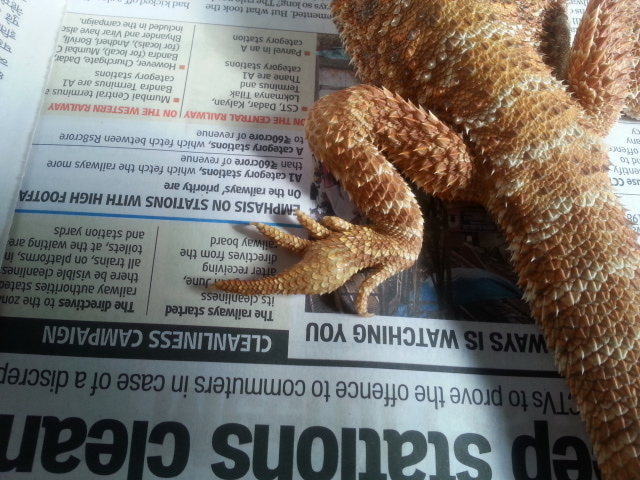 Requesting help for Bearded Dragon Gout
Question
Hind Leg Front Leg
Dear Tracie,
Requesting help for Bearded Dragon Gout
Question
Hind Leg Front Leg
Dear Tracie,
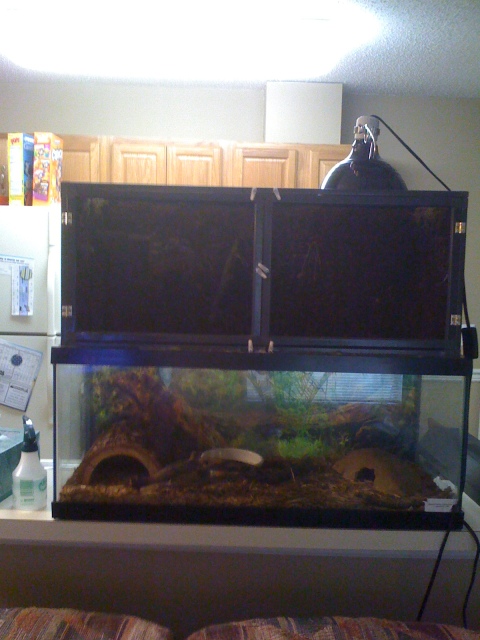 Heating/Lighting
QuestionQUESTION: I recently moved my Ball Python to a
Heating/Lighting
QuestionQUESTION: I recently moved my Ball Python to a
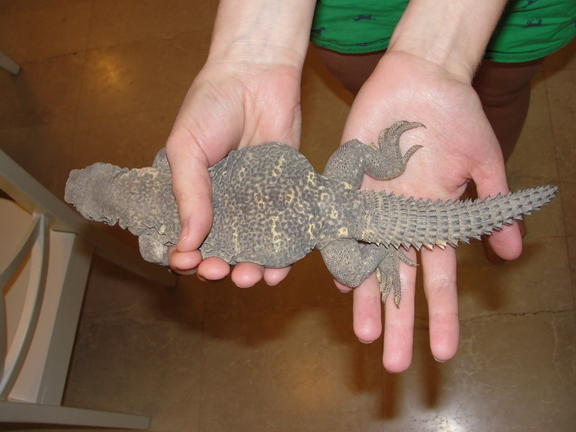 Uromastyx leg paralysys
QuestionQUESTION: I live in Saudi Arabia and am keeping
Uromastyx leg paralysys
QuestionQUESTION: I live in Saudi Arabia and am keeping
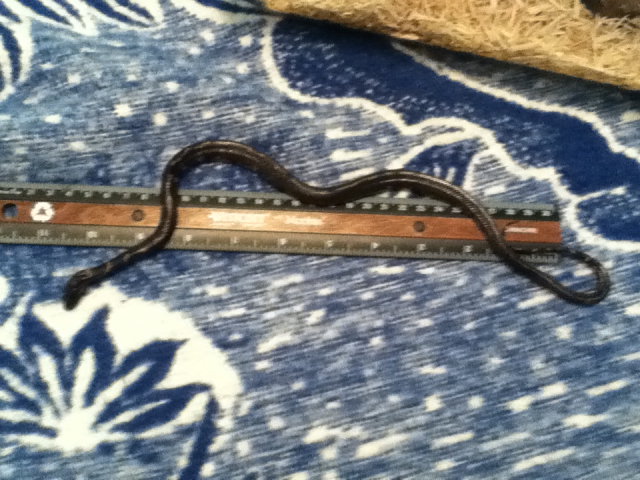 KING SNAKE MENTAL PROBLEMS
QuestionQUESTION: -Baby Baja king snake(8 months, 2 fee
KING SNAKE MENTAL PROBLEMS
QuestionQUESTION: -Baby Baja king snake(8 months, 2 fee
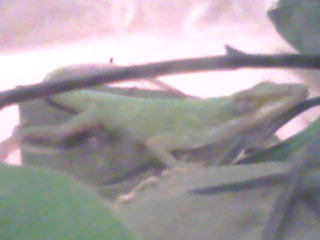 I think my Green Anole is sick
QuestionQUESTION: I have noticed two days ago that my a
I think my Green Anole is sick
QuestionQUESTION: I have noticed two days ago that my a